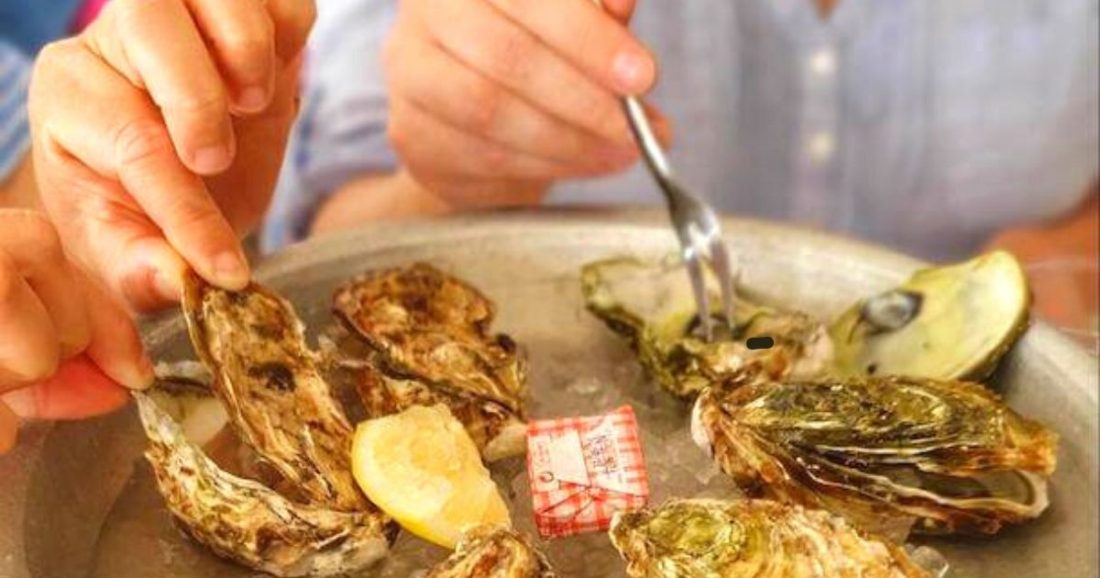What Typical Foods Should I Try in Toulouse?
So, you’ve arrived in Toulouse and you want a taste of local life and culture, of the city’s atmosphere and history. Well, there’s simply no better way to get to the heart of a French city than through its food culture. France, after all, is a serious contender for possessing the world’s richest food scene. (Have a read of our What Foods Should I Try in France? article to discover some of the country’s many famous foods.)
Join us today as we explore some of our favorite, classic Toulouse dishes and ingredients. From indulgent desserts to top-class seafood and hearty stews, we chart the highlights you can expect to enjoy during your time in Toulouse.
And if you want to take your foodie experience in Toulouse to the next level, why not join us on one of our delicious and award-winning Toulouse walking tours — immerse yourself in the sights, sounds, and flavors of La Ville Rose.
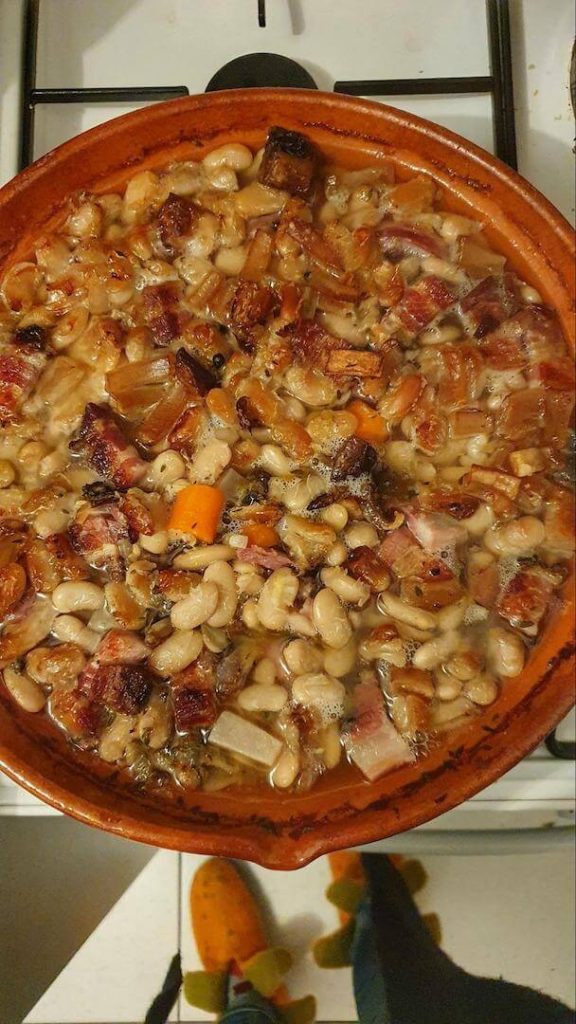
Cassoulet
This rich and warming, slow-cooked casserole is the quintessential Toulouse dish. The white beans (haricots blancs or lingots) essential to the stew are grown just downriver from the city and their origins can be traced to the nearby commune of Castelnaudary.
The name of the stew is taken from the cassole, the conical-shaped terracotta dish it is cooked in. This much is established, but the actual ingredients used to produce the cassoulet are widely argued over.
The inclusion of dried white beans is essential and not up for discussion, but the accompanying meats and fats are hotly contested. In Toulouse, cassoulet generally incorporates duck fat, duck confit, various forms of pork, and the local Toulouse sausages (saucisse de Toulouse). This is a Toulouse food you cannot miss out on!
Cassoulet is ubiquitous in Toulouse so you won’t be stuck for places to find the dish. Some of our favorite restaurants for cassoulet include l’Imperiale (at the Victor Hugo Market), le Colombier, and Restaurant Emile. However, if you don’t eat meat, we recommend the vegan cassoulet at the Cassoularium.
“Cassoulet, that best of bean feasts, is everyday fare for a peasant but ambrosia for a gastronome…” – Julia Child
Le Fénétra
Do you have a sweet tooth? If so, you will want to seek out Le Fénétra. This pastry features a harmonious coming together of sweet pastry crust, apricot preserves, candied lemon peel, and a biscuit-like top made of whipped egg whites and almond flour (similar to a macaron shell).
With storied (but maybe not actual) roots reaching all the way to ancient Gallo-Roman times, Le Fénétra has become the stuff of Toulouse legend.
In the wake of the two World Wars, the tradition of this unparalleled dessert was almost lost in Toulouse, but thankfully saw a revival in the 1960s when an association of artisan bakers from the Haute-Garonne department got together to trademark the name of the pastry
Today, only members of this association have the right to use the name “Fénétra” for this pastry.
Where to Find Le Fénétra?
There’s no shortage of good examples of this pastry in Toulouse, but our favorites are the shops where you can buy an individual-sized version: Pâtisserie Conté, La Bonbonnière, Au Poussin Rose, and the Fénétralia at Sandyan.
Want to know more about this fascinating sweet treat? Head to Le gâteau du Fénétra.
Saucisse de Toulouse
Saucisse de Toulouse (or Toulouse Sausage) is a fresh sausage made from pork (75% lean, 25% belly) and seasoned only with salt and pepper. Normally served with salad and fries (or aligot in the wintertime), the sausage is also used as a central ingredient in Cassoulet and Rougail saucisse.
It’s important to note that “Saucisse de Toulouse” is always singular – because it’s made in one, long continuous casing – never in links! (Be wary of sausage links from the grocery store claiming to be “Saucisses de Toulouse.)
When you order it at the charcutier, they will ask you how many people you want to serve, measure it out accordingly, and coil it up in a neat package. Then you can put the coil right on in the hot pan or on the grill.
If you want to make sure you’re getting the “real” thing, look for the label “Véritable Saucisse de Toulouse,” which was trademarked by a group of local charcutiers. Only those who make the saucisse in/near Toulouse with respect for the traditional recipe and artisanal methods are allowed to use this full designation.
The saucisse de Toulouse can also have a “label Rouge,” which denotes a higher quality of meat and limits the use of additives and preservatives. However, there is no restriction on where it can be made (so it’s possible it’s not from anywhere near Toulouse!).
One of our favorite places to buy the saucisse is from Maison Garcia, one of the artisan charcutier at the Victor Hugo Market. The sausage, though, does not have protected status and so you will find it produced by many different butchers.
You can read more about the Saucisse de Toulouse here.
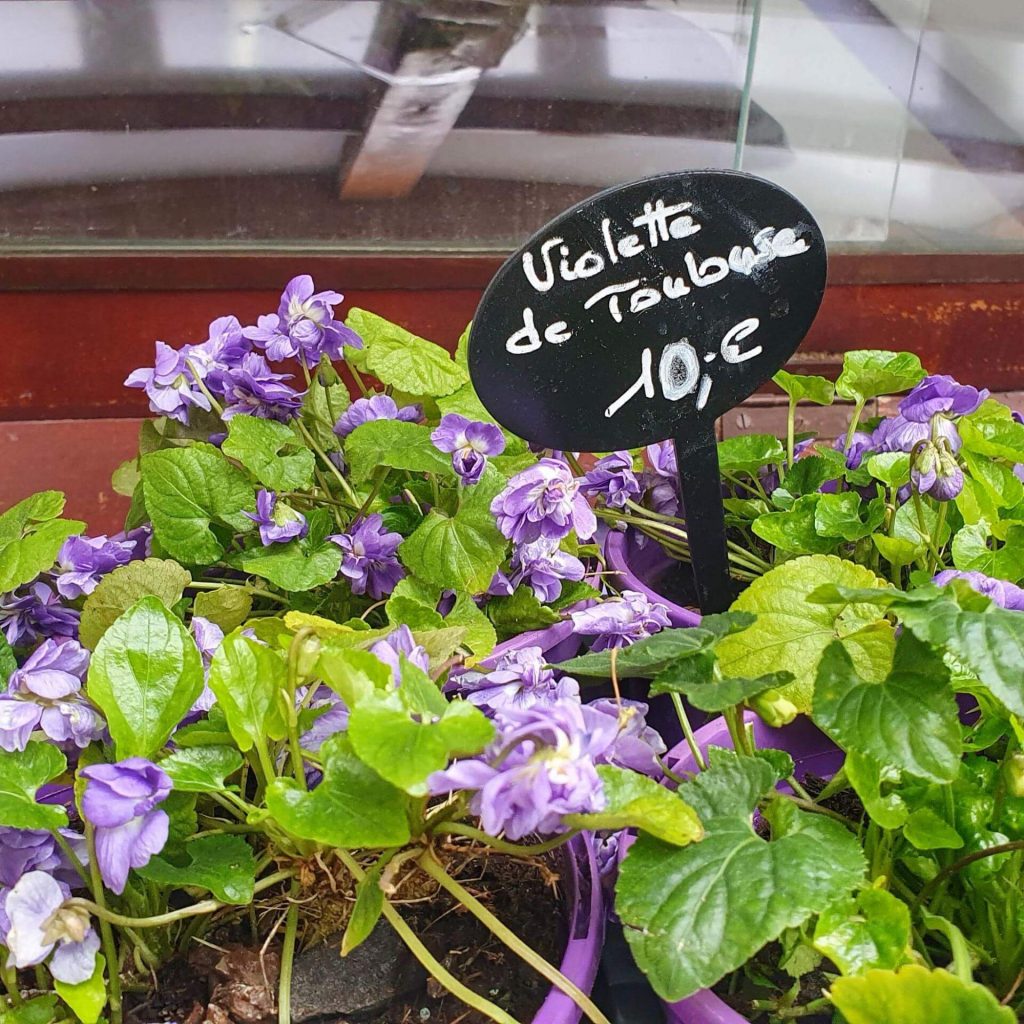
Violettes de Toulouse
One of the city’s most recognizable symbols, violets have been cultivated in Toulouse since the mid-19th century. Legend has it that it was a soldier in Napoleon III’s army who first introduced violets to Toulouse; he had collected them as a gift for his lover while stationed in Italy.
But the Violettes de Toulouse are not just a thing of beauty, they’re a remarkably versatile ingredient for food and drinks. It was thanks to this usefulness that the trade of violets boomed in Toulouse during the late-19th and early-20th centuries.
At the height of their popularity, the sale of violets was the primary source of income for around 600 Toulouse families who were exporting the flowers to countries as far off as Morocco, Great Britain, and Russia.
Alas, violet cultivation in Toulouse came to a sudden halt in 1956 when a uniquely freezing cold winter killed off most of the plants. By this time producers were facing much more global competition and so the trade was not revived.
However, in 1985 agricultural engineer Adrien Roucolle revived violet production using modern botanical techniques and thus ensured the flower would never become extinct in Toulouse. Though grown on a smaller scale, the violet again began to be used as an ingredient in cooking, a scent for perfume, or a flavoring for alcoholic drinks.
Each year, the city organizes the Fete de la Violette, a celebration of the beautiful flower so synonymous with the city itself. At the festival, one can buy perfumes, candles, confectionery, cosmetics, and a range of delicious foods.
Just some taste experiences open to those curious to sample the flavor of Violettes de Toulouse: violet tea; violet liqueur (Kir Royal/Imperial Toulousain); violet-flavored macarons; violet-infused chocolate.
The most famous violet-flavored food in Toulouse, though, is candied violet petals. Created by Candiflor France, a Toulouse confectioner, in 1818, their Violettes de Toulouse are made from fresh violet flowers crystallized in sugar. Using the same techniques since 1818, Candiflor produces these delicate sweets with great care. The end result is sweet to taste and beautiful on the eye.
The best place to try and buy almost anything made with Toulouse violets is La Maison de la Violette, which is located on a picturesque barge on the Canal du Midi.
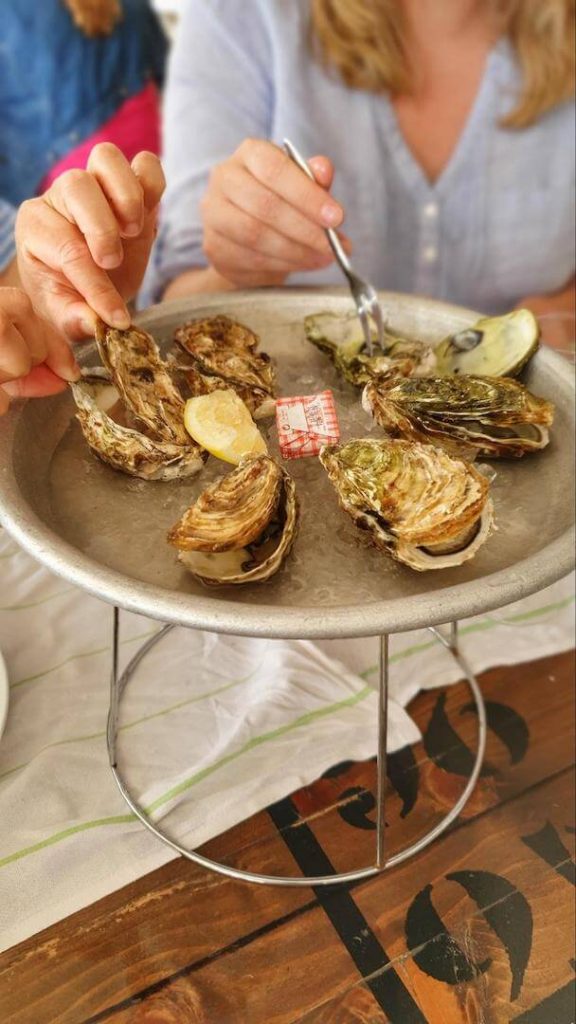
Oysters
Especially prevalent around Christmas time and New Year, oysters are an incredibly popular food with the citizens of Toulouse (as they are across France).
Even though Toulouse is landlocked, it’s only a few hours to either coast. Oysters that come from the Bay of Arcachon or the Île de Ré on the Atlantic, the Lagune de Thau on the Mediterranean, or from Brittany are easily found among the city’s markets and at the fishmongers.
One of the most time-honored pastimes in Toulouse is going to one of the poissonniers at the Victor Hugo Market for oysters and white wine (as an aperitif before going to one of the restaurants upstairs for lunch, or as lunch itself).
You can read more about oyster farming on the Atlantic Coast here.
Garbure
Meat and cabbage are the main ingredients in this traditional soup. With its origins in the kitchens of the peasant classes, Garbure would traditionally have been prepared using whatever leftovers the hungry cook had in their kitchen.
Continuing this tradition, you will find a great deal of variety in the Garbure found across Toulouse depending on the season and availability of ingredients. The point of Garbure is to provide a meal that is warming, nourishing, and easy on the wallet.
Where to Find Garbure in Toulouse?
Given the modest nature of the dish, it can be difficult to find garbure in a restaurant. You can, though, look for it at the Marché Victor Hugo, where vendors often sell it in glass jars, which is one of the traditional methods of food preservation in the southwest.
We certainly recommend exploring traditional cuisine at Toulouse’s markets and just because it comes in a can or jar doesn’t mean it was made in a factory!
If you fancy exploring Toulouse’s food culture in the company of an ex-cheesemonger, wine scholar, and love of all things Toulouse, consider joining us on our Victor Hugo Market Tour.
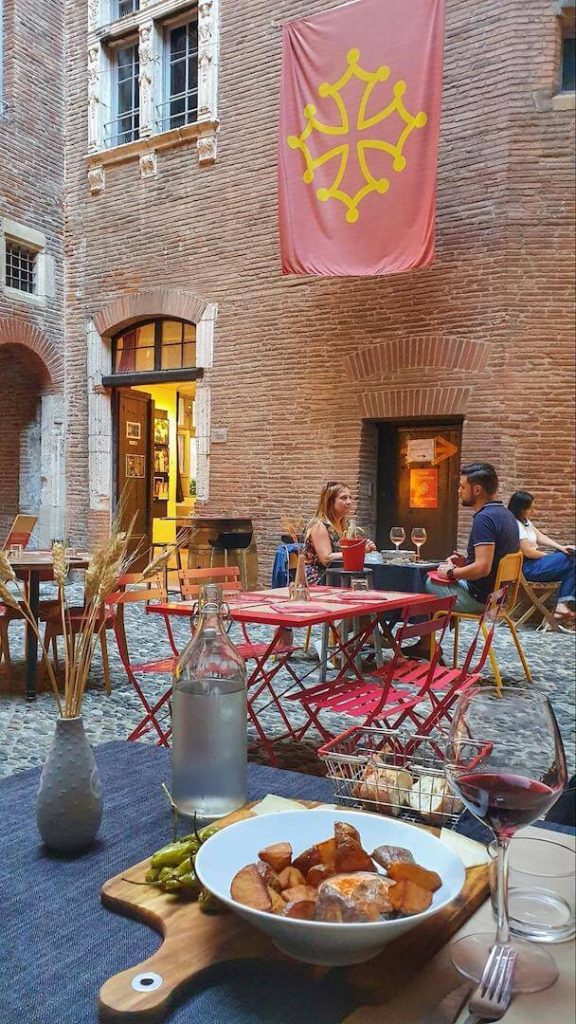
Tapas
Toulousains love to eat tapas, and although the tradition has been imported from Spain, it’s done exceptionally well across the city.
Toulouse is closer to Barcelona than it is to Paris and many Spanish people moved to this part of France as a result of the Spanish Civil War and economic problems, so the influence of Spanish culture is found in the city’s character and its cuisine. In fact, it’s this melding of the French and Spanish cultures that make Toulouse such a warm, inviting place.
You won’t find specific tapas dishes that can be said to belong uniquely to Toulouse, but the tapas-style dining fits the sociable atmosphere of Toulouse like a glove.
Hence, in wine bars around the city, your wine will be accompanied by tasty, small plates of food that are perfect for sharing with friends. If you look closely, many of them are made with local products, like cheese and charcuterie or local produce.
Our Favorite Tapas in Toulouse
As above, you’ll come across plenty of tapas menus as you browse the bars and bistros of Toulouse but we have found the following places offering consistently great tapas: Petit San Seb (Basque-style tapas and pintxos), and A Taula (gorgeous courtyard seating in an hôtel particulier that is now an Occitan cultural center).
This brings to a close some of our list of typical Toulouse foods that we think everybody should try when in Toulouse. It is by no means an exhaustive list (there are SO MANY good things to eat here!) and we plan to add to it as time goes on.
If you’re in town and want to get a local’s view of the Toulouse food scene, check out our list of Toulouse Food Tours.
If you have any questions at all, please get in touch.
Want more inspiration for your foodie exploration of France? Read our article on Dishes You Have to Try From the South of France.


